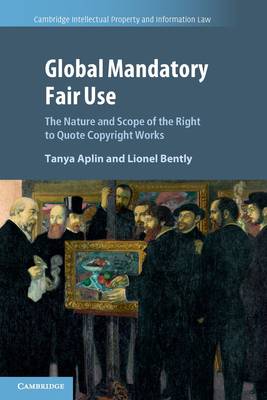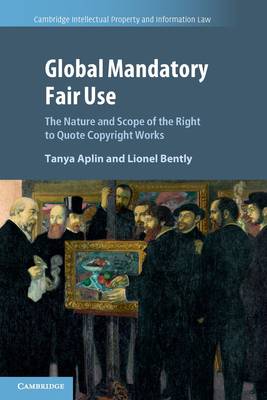
- Afhalen na 1 uur in een winkel met voorraad
- Gratis thuislevering in België vanaf € 30
- Ruim aanbod met 7 miljoen producten
- Afhalen na 1 uur in een winkel met voorraad
- Gratis thuislevering in België vanaf € 30
- Ruim aanbod met 7 miljoen producten
Zoeken
Global Mandatory Fair Use
The Nature and Scope of the Right to Quote Copyright Works
Tanya Aplin, Lionel Bently
€ 50,45
+ 100 punten
Uitvoering
Omschrijving
In a path-breaking work, Tanya Aplin and Lionel Bently make the case that the quotation exception in Article 10 of the Berne Convention constitutes a global, mandatory, fair use provision. It is global, they argue, because of the reach of Berne qua Berne and qua TRIPS, and its mandatory nature is apparent from the clear language of Article 10 and its travaux. It relates to 'use' that is not limited by type of work, type of act, or purpose and it is 'fair' use because the work must be made available to the public, with attribution, and the use must be proportionate and consistent with fair practice. By explaining the contours of global, mandatory fair use - and thus displacing the 'three-step test' as the dominant, international copyright norm governing copyright exceptions - this book creates new insights into how national exceptions should be framed and interpreted.
Specificaties
Betrokkenen
- Auteur(s):
- Uitgeverij:
Inhoud
- Aantal bladzijden:
- 282
- Taal:
- Engels
- Reeks:
- Reeksnummer:
- nr. 56
Eigenschappen
- Productcode (EAN):
- 9781108812801
- Verschijningsdatum:
- 7/07/2022
- Uitvoering:
- Paperback
- Formaat:
- Trade paperback (VS)
- Afmetingen:
- 152 mm x 229 mm
- Gewicht:
- 381 g

Alleen bij Standaard Boekhandel
+ 100 punten op je klantenkaart van Standaard Boekhandel
Beoordelingen
We publiceren alleen reviews die voldoen aan de voorwaarden voor reviews. Bekijk onze voorwaarden voor reviews.











